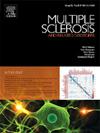Functional neurological disorder in multiple sclerosis: A prospective study
IF 2.9
3区 医学
Q2 CLINICAL NEUROLOGY
引用次数: 0
Abstract
Background
There is increasing recognition Functional Neurological disorder (FND) is comorbid with other neurological conditions, but little is known about patients with Multiple Sclerosis (MS). We therefore systematically evaluated the presence of FND in consecutive patients with MS and its clinical correlates.
Methods
Three-hundred and ten consecutive MS patients, seen at our center on either elective or emergent basis, underwent a structured protocol to gather demographics and data about clinical features, previous and current treatments and presence of mood disorders and were additionally assessed by an expert in FND. Patients with and without FND were then compared to identify clinical correlates with the functional comorbidity.
Results
Overall, we found that 5.8 % of patients with MS had comorbid FND. Of note, 22.6 % (7/31) of MS patients admitted on an emergent basis for a suspected relapse were found to have incident FND. Patients with comorbid FND had higher rates of clinically significant mood disturbances and a higher number of previous therapeutic switches due to treatment failure or to side effects than patients without FND. Depression, relapsing remitting MS and disability were found to independently predict the presence of FND.
Conclusions
FND is relatively frequent in patients with MS. As the two conditions might have similar phenomenological presentations, it is important to properly screen and recognize FND because of crucial treatment implications.
多发性硬化症的功能性神经障碍:一项前瞻性研究。
背景:越来越多的人认识到功能性神经障碍(FND)与其他神经系统疾病共病,但对多发性硬化症(MS)患者知之甚少。因此,我们系统地评估了连续多发性硬化症患者中FND的存在及其临床相关性。方法:310例连续在我们中心就诊的选择性或急诊多发性硬化患者,接受了一项结构化的方案,以收集有关临床特征、既往和当前治疗以及情绪障碍存在的人口统计学和数据,并由FND专家进行额外评估。然后比较有和没有FND的患者,以确定与功能合并症的临床相关性。结果:总的来说,我们发现5.8%的MS患者有并发FND。值得注意的是,22.6%(7/31)因疑似复发而入院的MS患者发现有偶发性FND。与没有FND的患者相比,合并FND的患者有更高的临床显著情绪障碍的发生率,并且由于治疗失败或副作用而导致的先前治疗切换的数量也更高。发现抑郁、复发缓解型MS和残疾独立预测FND的存在。结论:FND在ms患者中相对常见,由于两种情况可能具有相似的现象学表现,因此正确筛查和识别FND至关重要,因为这对治疗具有重要意义。
本文章由计算机程序翻译,如有差异,请以英文原文为准。
求助全文
约1分钟内获得全文
求助全文
来源期刊

Multiple sclerosis and related disorders
CLINICAL NEUROLOGY-
CiteScore
5.80
自引率
20.00%
发文量
814
审稿时长
66 days
期刊介绍:
Multiple Sclerosis is an area of ever expanding research and escalating publications. Multiple Sclerosis and Related Disorders is a wide ranging international journal supported by key researchers from all neuroscience domains that focus on MS and associated disease of the central nervous system. The primary aim of this new journal is the rapid publication of high quality original research in the field. Important secondary aims will be timely updates and editorials on important scientific and clinical care advances, controversies in the field, and invited opinion articles from current thought leaders on topical issues. One section of the journal will focus on teaching, written to enhance the practice of community and academic neurologists involved in the care of MS patients. Summaries of key articles written for a lay audience will be provided as an on-line resource.
A team of four chief editors is supported by leading section editors who will commission and appraise original and review articles concerning: clinical neurology, neuroimaging, neuropathology, neuroepidemiology, therapeutics, genetics / transcriptomics, experimental models, neuroimmunology, biomarkers, neuropsychology, neurorehabilitation, measurement scales, teaching, neuroethics and lay communication.
 求助内容:
求助内容: 应助结果提醒方式:
应助结果提醒方式:


